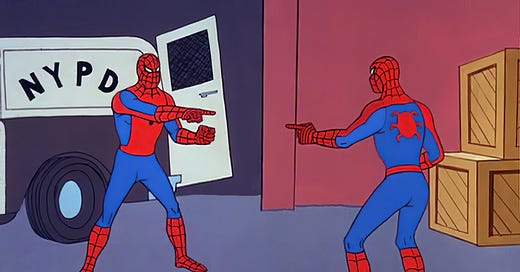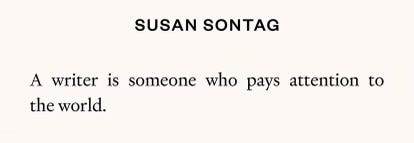Something I've started to notice is when people in my vicinity copy my movements almost immediately after I do them. I know myself to be very sensitive, but I also know that I am wrong more often than I’m right, and so after the first handful of instances, I gaslit myself about them. I told myself, “That’s just a coincidence” and “No one is watching you like that.” I thought of myself as self-involved when I was having a drink with a friend and I silently noticed they picked up their drink after I did. But the more I tried to convince myself it wasn’t there, the more I saw it.
One summery and sticky afternoon, I planned to read in a local café. I had been to this specific café a handful of times and the nostalgic feeling I got from sitting in its atmosphere brought a sense of relief. The marquee letters that spelled out the name of the establishment were on even though it was the middle of the day, and customers could hear a low hum throughout the room. This hum consisted of other customers talking, baristas taking orders and talking to each other, and the music at a modest volume coming from the ceiling’s speakers. I ordered my drink and chose a booth to read in. There were three people surrounding my spot in the café. After picking up my drink from the counter, bringing it back to my seat and reading for a few minutes, I remembered that I had ordered an iced drink and the melted ice would water down my first sip if I didn’t drink from it soon. I picked up the plastic cup, slick with condensation, lifted it to my mouth and as quick as a camera flash, caught the actions of two of the three people sat near to me. Both of them had picked up their drink after I was already in the process of bringing my cup to my lips. I did not make eye contact with either individual before, during or after the synchronized sip. It was noticeable to me because the movement looked staged. Robotic. If I had paid even closer attention (if that was even possible), would the people, farther from me but closer to the two that drank with me, have taken a sip of their drinks too? Could we have created a ripple effect through this place? That was the moment when I took a mental note to do research on this phenomenon once I got home.
I fully expected to not find anything when I started my online research. Turns out I wasn’t developing late onset schizophrenia or had awoken a gene that turned on narcissistic tendencies in my subconscious. I had been validated by Google introducing me to “mirror neurons.” Mirror neurons are a specific type of brain cell that receive a controlling influence over them “when an individual executes a specific motor act and when they observe the same or similar act performed by another individual,” according to this 2013 research paper. The paper states that the scientists that first discovered mirror neurons had come across it while experimenting on monkeys. Scientists noted when one monkey would pick up, for example, a peanut and take a bite, a nearby monkey watching this all go down would experience the exact same sensations in their brain, as if they had picked up the peanut themselves and taken a bite. So when the two individuals saw me pick up my drink out of their peripheral, their impulse to do the same was automatic. A 2005 article from the American Psychological Association notes that mirror neurons in humans can even pick up the intent behind actions. Marco Iacoboni, a neuroscientist at the University of California, Los Angeles, watched 23 participants look at three videos of a hand picking up a teacup. In one video, the teacup sat among tea and cookies and the hand grasped the cup to take drink. In the second video, the food and drinks were gone and all that remained were the cups and silverware. The hand appeared again and this time it was clearing the table. In the final video, the teacup was alone, with no context and no hand. Iacoboni and his colleagues’ results showed that mirror neurons in the premotor cortex, the area of the brain that is necessary for preparing and executing limb movements, reacted more strongly to the videos with context than the video without. The neurons of my café neighbors ingested the context of the environment and fired off from the premotor cortex so quickly, it led to all of us being synchronized. And their brains were right to assume that I would drink. Of course I was going to drink from the cup in front of me as I sat there with a book. There was no other context to suggest I would do anything differently.
Life experiences have altered my mindset and set me down every way but the straight and narrow path. I now jump to conclusions that, more often than not, involve me being excluded. Whether its the idea that I’m being excluded because of my race, sex or I just wasn’t at the right place at the right time and had therefore missed out, I expected to be left behind. It’s a narrative that never quite escapes me. It holds tight to my wrist, and pulls me down a dark hallway where there are voices that tell me that I deserve to be excluded. And those voices were convincing. When I first noticed mirror neurons in action, the air of exclusion started to dissipate. There was no puffing my chest or being annoyed. I am the oldest of three. I’m used to my younger siblings, cousins, neighbors and classmates copying me. My father drilled it into my head that because I was the firstborn, I had to set a good example. It wasn’t until I started noticing it around strangers or people I had met once where I knew this wasn’t just imitation. When the action came from strangers and I noticed it, it felt like exhaling. So I wasn’t as different from people as I was led to believe. There’s nothing wrong with me. The way I understand it, mirror neurons only work if we see the person doing an action as similar to us. My amygdala constantly nudging me to not forget how the intersection of me being both Black and a woman puts me on the fringes of society does not matter when the cellular makeup of non-Black and non-women individuals see me as one of them. Whether they personally believe that or not is not important. This is not to take away the importance of my identity as a Black woman or the fact that systemic prejudices are still in place in America. I am incredibly proud to be who I am, to have the lineage I do and to come from a race of people who have faced worldly atrocities and made it out alive. But learning about how horribly Black people were treated during the Jim Crow era as a child and seeing racism up close and personal on my laptop screen in recent years (casually racist memes, police brutality and non-Black people calling the police on Black people), how does that not stick with a person? All of this injustice occurs because I happen to be more melanated than a person with mostly European descent. My parents were born in the early 1970s. The Civil Rights Act was passed less than a decade before their existences. Is it really so crazy for Black people to keep that not-too-distant past at the forefront of our minds? How does that not affect how I move through the world? These are questions I personally keep in the back of my mind because if I hold them in the front, they have the ability to paralyze me. I won’t do anything worthwhile. And the misogyny. Whether it comes in the form of being treated like an object or being treated like I’m not intelligent enough to know what’s going on, the compounding weight of the two marginalizations are heavy. The distortion that I’m too different to be a part of society has to move out of the way. It’s not true and it’s never been true despite what the KKK would want me to internalize. Hell, we might have a Black woman as President of the United States soon. I’m keeping the mirror neurons in my back pocket because it helps me from having a panic attack about something I cannot change. I’m just as capable as anyone else because their mirror neurons see me as just like them. They’ll now remind me that I was never the issue. Their existence will unfreeze me when I’m convinced I won’t get anywhere because of how I was born. Even when discrimination comes my way, my mirror neurons will gently tap the inside of my nervous system and remind me that my sense of self needs to be unshakeable. Move on and try again. No matter how much certain people may dislike that I exist.
The 2005 American Psychological Association article about mirror neurons ends with these lines:
It seems we're wired to see other people as similar to us, rather than different … At the root, as humans we identify the person we're facing as someone like ourselves.
💓If you missed last week’s article, you can read it here:💓






